- Donald Tusk warns of ‘exodus’ lasting years.
- Merkel backs quota system as ‘minimum’
- Record number of Syrians cross into Macedonia
- Read the latest summary
The Guardian
Link
French officials have travelled to Munich to prepare to accept thousands of the refugees who have arrived there to be transferred to France, writes our Paris correspondentAngelique Chrisafis.
Thousands of people are still trying to cross from Greece into Macedonia, after a record number of 7,000 Syrians arrived in the last few days. A selection of images from today provides a glimpse of the scene.
Poland’s president Andrzej Duda has repeated his government’s objections to a Europe-wide system of refugee quotas imposed.
Echoing an argument that has also been made by David Cameron, Duda said:
“In Europe the talk is all the time about fighting the systems, and not the causes of the crisis. Europe is in a kind of a closed circle.”
“In Europe the talk is all the time about fighting the systems, and not the causes of the crisis. Europe is in a kind of a closed circle.”
Polish Prime Minister Ewa Kopacz said last week that the European Union must help people who flee wars and Poland is ready to discuss its role but does not want to accept automatic quotas.
Hassan Abu Walied, a 45-year-old father of two from the war torn northern Syrian city of Aleppo has made it to a refugee camp in Nuremberg, after a journey of bribes and beatings via Macedonia and Hungary.
He told the Guardian’s Mona Mahmood why he shunned refugee camps in Turkey.
The camp in Nuremberg is congested with more than 750 Syrian, Iraqi, Sudanese and Albanian refugees. The queue for the breakfast in the morning can take two hours for a single man. The Turkish staff always give preference to families. “You have to wait till the families have their breakfast or you will be sent back to Syria,” they say.My main concern was to take my family out of Aleppo before we were killed by a random shelling or bullets from snipers. But I didn’t want them to risk the journey to Greece.I thought about registering with the UN in Turkey to help get settled in Europe or the US, but the wait was too long. The UN said it might be 2022 before I could leave Turkey. I couldn’t survive that long in Turkey without having any income.So I went with my two brothers who had lost their houses and businesses in Aleppo, and travelled on a shaky cracked boat filled with 50 refugees. The trip from Azmir cost us $1,150 each.We only got to the Greek coast after help from the coastguard. The boat’s motor broke down after six hours at sea.I then used GPS to guide me to the Macedonian borders. I and many other refugees were kicked by the Macedonian police. They held us overnight and then started to release 10 refugee every hour.The situation at the Serbian borders was better but we had to pay to get there. The train ticket was €5 from Belgrade, but we had to pay €25, and when we got in the train, the inspector charged us another €50.We walked along corn fields and were then seized by the Hungarian police who would only release us after we paid €200. Then, we took a taxi for €650 to take us to Budapest. There we met a smuggler who transferred us by a van to Germany after paying another €475. The van was supposed to have only eight passengers but there were 20 of us inside.I used to live as a king in in Aleppo, with a thriving wood business, but there is no future in Syria. The war might last for another 20 years. I don’t want my little kids to turn into beggars or thieves. I want them to have a good education in Germany and that’s why I left Turkey for Germany.
Summary
Here’s a summary of the latest developments:
- Germany could take 500,000 refugees each year for “several years”, according to the country’s vice-chancellor, Sigmar Gabriel. “I believe we could surely deal with something in the order of half a million for several years,” he told ZDF public television.
- German Chancellor Angela Merkel has given her backing to the EU quota plan to accept an extra 160,000 refugees, but suggested the quotas were just a first step. She also called for an open asylum system to replace the Dublin III arrangement under which asylum applications have to be processed at the point of entry to the EU.
- Donald Tusk, the president of the European council, warned of a refugee “exodus” lasting for years. “The wave of migration is not a one-time incident but the beginning of a real exodus, which only means that we will have to deal with this problem for many years to come,” he said.
- A record number of 7,000 Syrians reached Macedonia on Monday and a further 30,000 Syrians are in Greece, according to the UNHCR. It called for a “guaranteed relocation” system.
- Europe’s border agency Frontex has offered to help Greece to increase the number of immigration screening officers on the islands of Lesbos and Kos. Frontex director Fabrice Leggeri, said: “Greece is facing a critical migratory situation.”
- The UN has warned that the Schengen system of free borders faces collapse if Europe continues to fail to come up with a coordinated response to migration. Peter Sutherland, the secretary general special representative for international migration, said: “Schengen most definitely could fall apart, and probably will fall apart if we don’t get a common European policy in respect of migration.”
- United Nations Secretary-General Ban Ki-moon has appealed to European leaders “to be the voice of those in need of protection” and to quickly find a joint approach. Ban spoke by telephone with several European leaders to discuss the migration crisis.
- Denmark has placed adverts in Lebanese newspapers announcing tighter regulations and cuts in provisions in an attempt to warn off asylum seekers. The advertisement published on Monday said that social assistance for newly arrived refugees was being reduced by up to 50% Al-Jazeera reports.
In her press conference Merkel also called for an open asylum system to replace the Dublin III arrangement under which asylum applications have to be processed at the point of entry to the EU.
She said the Dublin system “no longer works” as it means that both Italy and Greece are left to take in the bulk of Europe’s refugee influx.
“We must discuss a new asylum policy,” AFP reported her saying.
Whether you are a refugee or supporting refugees share your experiences, photos or videos with us by clicking on the GuardianWitness ‘contribute’ buttons on the top of this blog, filling in our form, or via WhatsApp by adding the contact +44 (0) 7867 825056
The House of Commons is about to debate Britain’s response to the refugee crisis. You can follow the debate from 1.30pm on this live feed.
German Chancellor Angela Merkel has given her backing to the EU quota plan to accept an extra 160,000 refugees.
She said the quotas suggested under the scheme, including Germany’s allocation of 31,000 refugees, were a minimum.
“This joint European asylum system cannot just exist on paper but must also exist in practice - I say that because it lays out minimum standards for accommodating refugees and the task of registering refugees,” she told a joint news conference with Swedish Prime Minister Stefan Lofven in Berlin.
Earlier German’s vice chancellor Sigmar Gabriel said Germany could take 500,000 refugees for several years.
Merkel said that European Union states needed to find a joint solution to the refugee crisis, rather than threatening each other if they did not collaborate.
“I personally, and we spoke about this, am of the opinion that we should not now outbid each other with threats,” she said. “We should speak to each other in a spirit of mutual respect.”
At Roszke, Hungary’s border town with Serbia, there have been more reports of scuffles between asylum seekers and the security forces.
Migrants made two attempts Tuesday to break free from a police line at a collection point for migrants in Roszke but were pushed back, according to AP. Some migrants said it was so bad that they wanted to return across the border to Serbia, but Hungarian police wouldn’t let them.One Syrian who only gave his first name, Ali, was angry at the treatment by police.He said: “We’ve been here for two days and the Hungarian government only brings one bus? We’re asking to go back to Serbia and they are not giving us this right. We’re asking to go to Budapest and they are not giving us this right. Why? Why?”
But another reporter in the area, NBC’s Carlo Angerer, said police appear to have given up trying to stop people running through fields at the border.
The BBC’s Imelda Flattery confirmed the report.


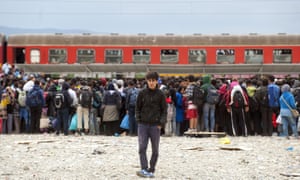
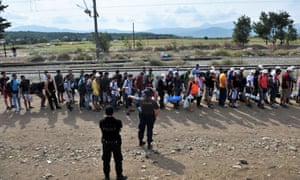
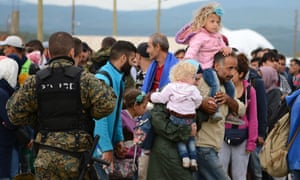
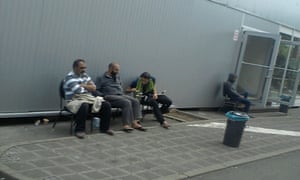
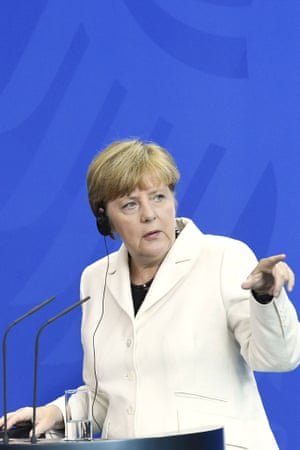
No comments:
Post a Comment